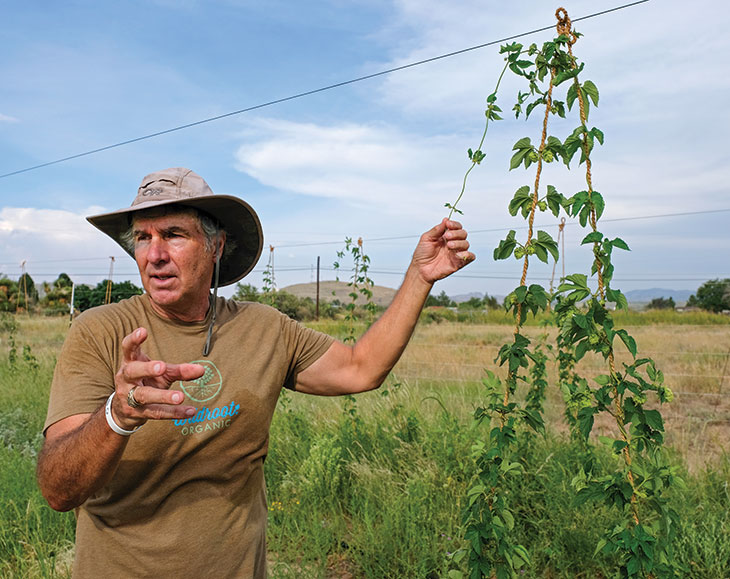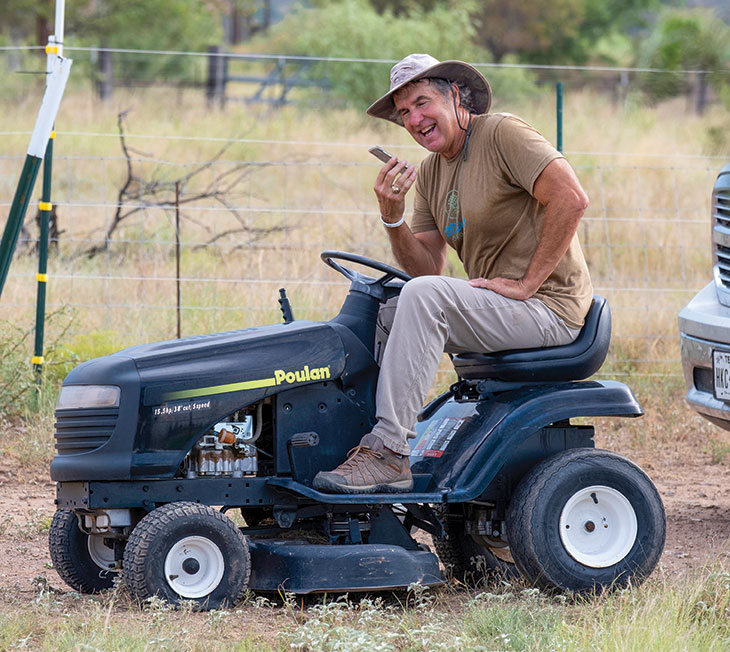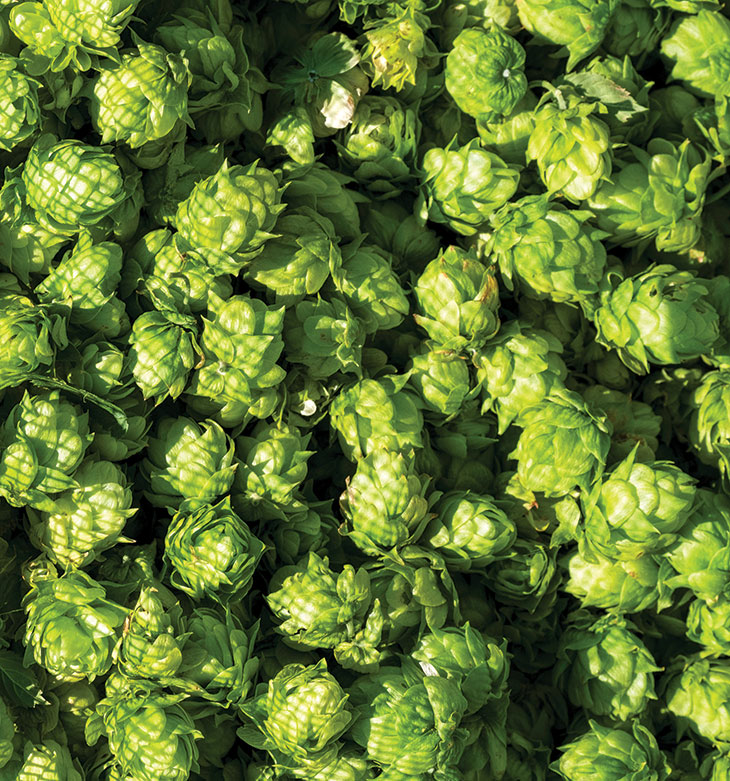
Photo by Zach Ryall
Hops thrive in Alpine, Texas, at Ruach Organic Farm — named after the West Texas wind.

Photo by Zach Ryall
Horticulturist David Steinbrunner grows organic, handpicked hops for Texas craft brewers. The climbing plants can grow over 14 feet high, and produce several pounds of fresh hops each.
In the Lone Star State, products featuring all Texan ingredients can earn serious bragging rights. But it hasn’t been easy to brew pure Texas beer — until now.
With the support of Capital Farm Credit, David Steinbrunner is growing hops under far West Texas skies. And not just any hops — they’re organic, hand-picked hops, delivered at the peak of freshness.
Growing in Tough Conditions
Hops are hard to grow in Texas, preferring temperate areas like the Pacific Northwest.
Growing plants in challenging conditions is nothing new to Steinbrunner, however.
The horticulturist and avid home brewer has owned an organic landscaping business in the Texas Hill Country for years. He also developed a blend of friendly fungi called mycorrhizae to help plants build strong root systems.

Exhibiting his Wildroot Organic mycorrhizae at the American Hop Convention a few years ago sparked an idea.
“There were people from Southern California, Florida and Arkansas who’d grown hops commercially for years,” he says. “I thought, why not grow in Texas? If we find the right spot, maybe we can.”
Needing Cooler Nights
Steinbrunner spent two summers growing hops as a test before looking for land. He ultimately chose Alpine — 4,500 feet high and tucked between mountain ranges — because it’s similar to America’s hops capital.
“Yakima, Washington, frequently has the same conditions in July and August [as Alpine],” he says. “It’s semiarid and hot, but cool at night. Hops need that to recover.”
In 2017 he and his wife, Teresa, purchased West Texas land with good water and volcanic soil.
Financing From an Enthusiastic Lender
Commercial banks had not been interested in financing a hop yard. But Capital Farm Credit refinanced the land, freeing up funds to install plants, trellises and an irrigation system.

Photo by Zach Ryall
Steinbrunner and most of the family brew beer — some winning national awards.
“David had done his homework,” says Tim Traister of Capital Farm Credit in Austin, near the Steinbrunners’ home on Lake LBJ. “Even before I met him, I’d thought about how Texas hops would be a selling point for breweries. Having a true Texas product is a good way to distinguish yourself.”
Steinbrunner appreciates having such an enthusiastic lender.
“It’s a totally different atmosphere working with Capital Farm Credit,” he says. “They’re great.”
He started planting hops in 2018, and now has over 2,000 climbing perennials on 3 acres.
“From a little rhizome, they’ll grow 15 feet that first year,” he says. “The second year, you can harvest a lot. And the third year should be amazing.”

Photo by Zach Ryall
Craft brewers Brodie Pierce, left, and Alton Huebner of Brick Vault Brewery used the fresh, local hops this summer in a beer they called Brewster County’s Best.
Hand-Harvesting Hops
Steinbrunner gets more than one crop in Texas’ long growing season by hand-harvesting the hop flowers instead of cutting down entire plants. He also freezes his hops within 30 minutes of picking, preserving their freshness for craft brewers.

Photo by Zach Ryall
Hops are the female flowers of the climbing plant Humulus lupulus. The hardy growers survived an unseasonable hailstorm this year.
Customers include Jester King Brewery in Austin, Martin House Brewing Co. and TexMalt in Fort Worth, and the Gage Hotel’s Brick Vault Brewery and Barbecue in Marathon.
Brodie Pierce, Brick Vault’s former head brewer, was surprised to learn hops were growing 30 miles away.
“In brewing, we mostly deal with [dried] hop pellets, which look like a tiny version of a range cube you’d feed cows,” Pierce says. “But a fresh hop is this beautiful, fragile flower. You get a lot of fresh aromas.
“We decided to brew with his hops because we’re all about showing off this area of Texas. … Everyone liked the flavor profile.”
Steinbrunner is still refining his hop varieties and trellising methods for West Texas. And he looks forward to robust crops as his plants mature.
“Hop production in the state would have to be much, much greater for someone to use just Texas hops in their brewing,” he says. “But this at least gives brewers some beers that can be all-Texas now. And that’s kind of cool.”
— Staff
All About Hops
Sometimes the best recipes have the fewest ingredients. Beer has four: grain, water, yeast and hops.
Hops — the female flowers of the hop plant — grow on bines, stems that climb by wrapping clockwise around a support. Yellow lupulin glands in the flowers contain the oils and acids that give beer its aroma and bitterness.
Depending on the cultivar, hops can be citrusy, floral, spicy, fruity, piney, herbal and more. Their bitterness balances out beer’s sweetness, while antimicrobial qualities keep the beer fresh.
And if beer makes you sleepy, that could be the hops, too. They have sedative properties and can be used in a relaxing tea.